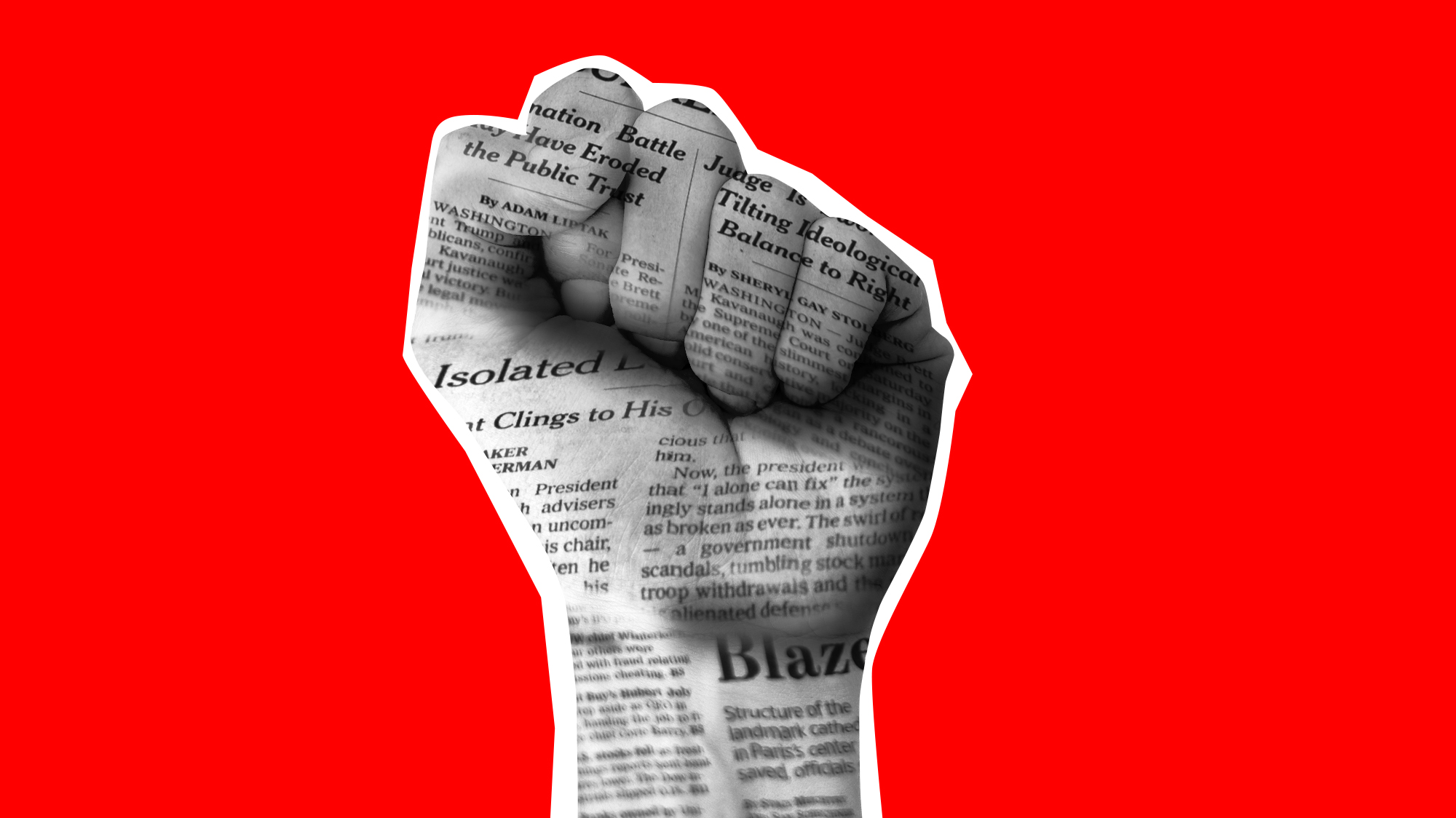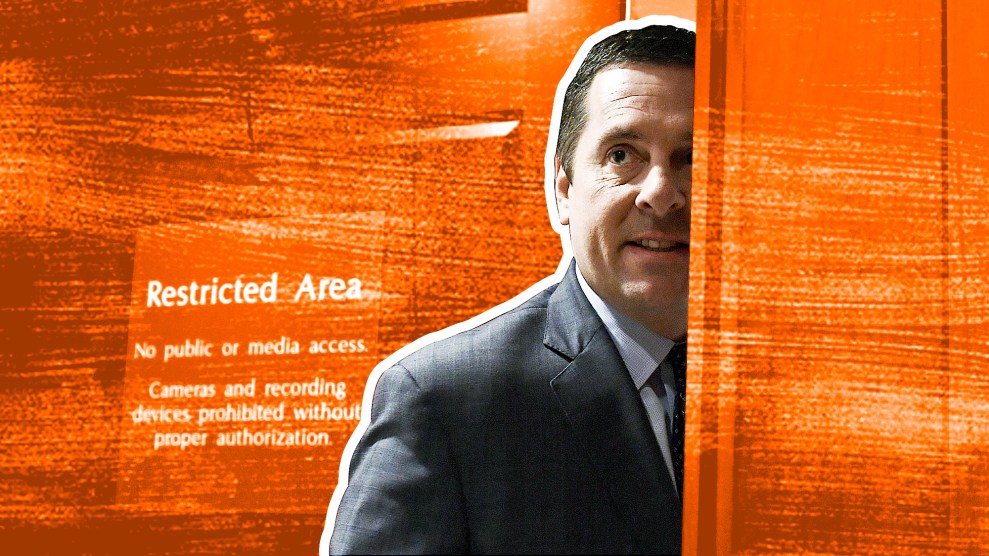Over the past month or so, the New York Times’ executive editor, Dean Baquet, has been giving a handful of interviews about the role of journalism in general, and the New York Times in particular. One of these, with the BBC, briefly had our ears burning. “I make it very clear when I hire, I make it very clear when I talk to the staff, I’ve said it repeatedly, that we are not supposed to be the leaders of the resistance to Donald Trump,” Baquet said. “That is an untenable, nonjournalistic, immoral position for the New York Times. If I was the editor of Mother Jones, I would say otherwise.”
Wait, what? I was working on this column on a plane next to my teenager, who peeked over my shoulder as I transcribed the quote. “Whoa, that guy is flaming you guys!” Don’t you think, I asked, that he could just be saying that their work and ours is different?” He paused, reread. “No, Mom. He’s flaming you.”
Baquet is a strong and fearless editor whose career has often put him at odds with the powers that be, not least as a pioneer in a field where journalists of color have encountered nonstop obstacles and are still dramatically underrepresented at the top. At the beginning of the past decade’s wave of newsroom downsizing, he urged editors everywhere to resist cost-cutting owners, and lost his job at the top of the Los Angeles Times masthead as a result. (That was when the fight was over cutting the LA Times’ newsroom from 1,200 to 960. Sob.)
So why would Baquet feel the need to sideswipe a competing news organization—and at Mother Jones, we’re not shy about competing with a newsroom 25 or so times larger—as immoral and nonjournalistic?
The answer is at the heart of the crisis in journalism right now. It has to do with how the Times, and much of the rest of American elite mainstream media, has backed itself into a defensive position that hurts their audiences and fails to serve the democracy on which their work depends.
That’s what I believe. But this isn’t just about what I believe—it’s about what the job of journalists should be. And while we journalists would love to think we know the answer, it’s not really for us to decide. It has to be a conversation with our audience: You. Nowhere does that apply more than here at Mother Jones, since our work is possible only because of readers who support it.
So let’s have the conversation. Here’s a quick survey to get your initial read; below I’ll also dig into some deeper questions that we’d love your feedback on.
Let’s unpack this New York Times moment a little more. The Times is an iconic institution, almost without peer in the journalism world. Powerful people are obsessed with it, no one more so than Donald Trump, who, it’s clear, still craves and courts its approval despite all his vitriol. So are readers (especially those on Twitter) who intently parse its choices, especially the controversial opinion section. Its successes set the bar for others, and so do its failures.
Baquet first rolled out his not-leaders-of-the-resistance argument publicly after an infamous failure, the “Trump Urges Unity vs. Racism” front-page headline just after the El Paso and Dayton shootings. In the face of an outcry from readers and Times staffers, he impugned his critics’ motives. He cast the Times’ position as principled resistance, not to hate or mass shooters or a president who exploited both—but to its readers.
To be sure, part of the idea Baquet invokes is indisputable: A newsroom should not cast itself as the leader of a political movement (and no political movement that waits for a newsroom to lead it will get far). But the critics of “Trump Urges Unity” were not asking the Times to do that. They warned that uncritically amplifying a line like that, from a president who has encouraged racist division at virtually every opportunity, does not serve the truth. That, after all, is why the Times quickly changed the headline, and why Baquet said it had been a mistake.
We all make mistakes—a lot of them. Sometimes they are a tell of our weaknesses. And the weakness of America’s elite traditional newsrooms, including the Times, is their vulnerability to timidity and false equivalency.
These newsrooms are under fire right now from all sides. Lefty Twitter has made it a sport to pile onto individual reporters in a way that is hard to distinguish from bullying. But the most consequential attacks have consistently come from the right. It’s conservative billionaires who have launched lawsuits against news organizations; conservative talk-show hosts who scream about bias everywhere but on their shows. It was a Republican Congressman who body-slammed a reporter, and it is a Republican president who has made the media his number one target.
(And make no mistake, these attacks are not about politics. They are about journalism, period. When the conservative Weekly Standard dared to challenge Trump, it came under relentless fire and was finally shut down. Its former editor, Stephen Hayes, along with former National Review editor Jonah Goldberg, are launching a site that aims to do real reporting from a conservative point of view. I know there are lots of Mother Jones readers who wish there were such a thing; you can check them out here.)
What these attacks really are is the most basic form of working the refs: By howling about the “liberal media,” the Trump partisans seek to force their targets to defend their right flank. Elite mainstream news organizations have invested a lot in being seen as neutral arbiters of political discourse, and being characterized otherwise pushes all their buttons. They allow themselves to be put on the defensive as their fears are weaponized against them. And they end up missing important stories—or overdoing it on not-so-important ones as a result. Hillary Clinton’s emails were a story in 2016, but we know now that they did not merit the wall-to-wall coverage the Times and others gave them, even as it downplayed the Russia scandal. (October 31, 2016, when the Times published its somewhat infamous “Investigating Trump, FBI Sees No Clear Link to Russia” piece—even as my colleague David Corn exposed the fact that the FBI was investigating Christopher Steele’s memos on those same links—is perhaps the best argument ever for why we need a diverse media ecosystem.)
Was false equivalency, and the impulse that for each Trump scandal there had to be an equal and equivalent Clinton scandal, part of the reason for these misjudgments? Was it why the Times allowed itself to be used to legitimize Steve Bannon’s conspiracy theories—theories that would end up in the president’s head as he tried to extort Ukraine? And regardless of what happened in the past, will the right’s referee-working help amplify propaganda and disinformation in 2020?
That’s an important question because the “liberal media” howls are intended to influence not just newsrooms, but audiences too. And they work—even with liberals. They establish a false equivalency between Fox News and Breitbart on one “side” and the Times and CNN, or sometimes MSNBC and Mother Jones, on the other. I can almost guarantee that someone will say it at your Thanksgiving table: “When you watch Fox News and MSNBC, the truth is somewhere in the middle.”
But that’s like saying the truth is in the middle between an apple and an orange. MSNBC is an actual news network; it features a lot of liberal commentary, but it won’t allow its journalists to run afoul of the facts. (Remember how Lawrence O’Donnell had to apologize immediately after he got out over his skis with a claim on Trump and Russian oligarchs.) Fox News is nothing short of a propaganda organization, its content a toxic mix of conspiracy and contempt (and only a few journalists with allegiance to reality sprinkled in). They have less in common with news organizations on any point of the spectrum than they do with the Trump campaign.
That’s why Baquet’s comments are such a shame. He uses Mother Jones as a punching bag to position the Times as more palatable, more “tenable.” Look at those people over there, he’s saying. They are the biased ones, the ones who want to lead the resistance. But the “fake news” squad hates the Times for the same reason they hate Mother Jones—because they can’t stand it when journalists uncover inconvenient truths. The difference is that at MoJo, we can be unapologetic about this.
The fundamental mistake that conventional Washington journalism has made over the past four years is to imagine all of politics as two-dimensional—Democrat to Republican, left to right, with far too little attention to the many other fault lines that run through, across, and at a diagonal to that distinction. One of the most important of these other fault lines is the one between those who stand for democracy, with a small d, and those who abet authoritarianism and minority rule.
In that battle, journalists can’t just dispassionately chronicle two equally valid “sides.” A free press needs (and is needed by) lowercase-d democracy. We can’t exist without it.
The Times can’t and shouldn’t be part of a capital-R, partisan Resistance, but it better damn well be part of the lowercase-r resistance against authoritarianism and illiberalism. And if leaders like Baquet are worried about taking sides against the latter, they are failing (not to get grandiose, but dammit, it’s Defcon One here) their sacred mission.
This is journalism’s fight, but it’s not just ours. The people who scream “fake news” when we report the truth are the same people who attack anyone who dares to speak out online, women and people of color most of all. They literally raise money to go after individual journalists and their families. They file lawsuits against citizen activists and make local news anchors read robo-scripts. Standing up to that is not about partisanship. It’s about speaking truth to power and defending the freedom that allows us to do so.
That’s our case. But now it’s time for yours.
What do you think is journalism’s mission? Where do you see the difference between the Times or other elite mainstream news organizations and MoJo? What would you like us to double down on as we head into 2020? Your responses will inform our strategy going into an election year like no other. We need to focus on the job at hand, and with your help, Mother Jones can.
















